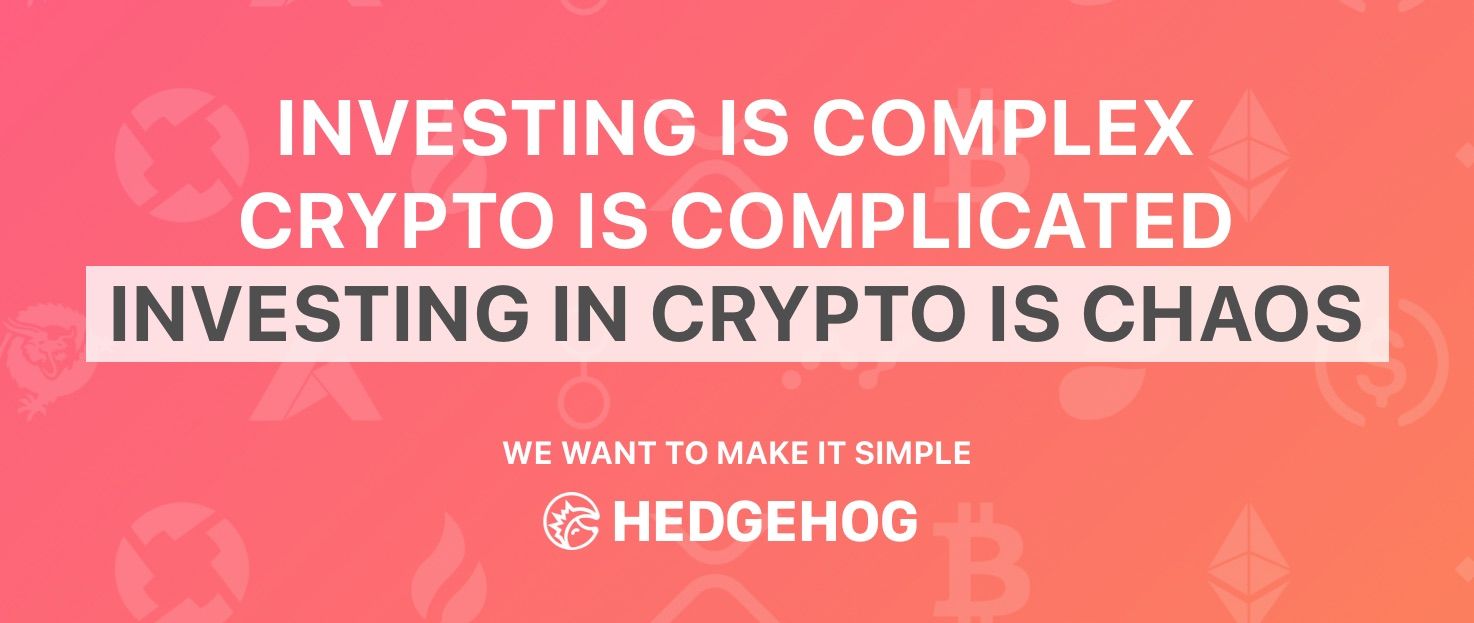Bitcoin is more than a decade old. Today there's a strong community of HODLers who've been around the block a few times, seen the mood bounce from bull to bear and back again. More than once. More than twice. And yet — as everyone will repeatedly remind you — it's still early days.
The number of people getting into cryptocurrency for the first time is larger than ever. Maybe that's you! If so, welcome to this wild, exhilarating world. Hedgehog users include longtime traders executing sophisticated strategies across several exchanges, and people newly dabbling with DOGE.
Only just feeling ready to start? Good news: common sense and gut instinct will take you far. The fancy tech can be hard to understand, but people are people are people. Above all, what's essential is keeping your wits about you.
Treat cryptocurrency investing like the virtual equivalent of walking through a big crowded tourist area with a somewhat seedy reputation (think Times Square or nearly any part of Paris). Lots to see, plenty of exciting experiences — but it's crucial to know where your valuables are at all times, lest they depart on their own vacation, never to return.
(Hey, y'know what might be handy for staying vigilant? An all-in-one portfolio dashboard tailored for tracking and trading every digital asset hassle-free. Jussayin...)

At Hedgehog we say crypto is chaos (see above) simply because it's true! Projects constantly pop up then blow up, either in the sense of mooning immediately for no discernible reason, or in the sense of imploding before they ever really get off the ground. The finance euphemism for all this cacophony and hubbub is "volatility" — conditions that present a great opportunity to make money, because big swings offer the potential for fast and dramatic ROI. Equally: fast and dramatic losses.
Getting involved is attractive, but people are understandably cautious. It's smart — you don't know what you don't know, because that's how not knowing stuff works. Fake Elon Musk won't send ETH if you pretty-please give him some first, but even that trick, familiar to denizens of "Crypto Twitter" who lived through the ICO craze, can be hard to spot if you don't already know what to expect. Remember, free lunches are a myth, and deals that seem too good to be true are in fact too good to be true.
My guess is you'd rather not discover your blind spots by losing a bunch of money. Hopefully you can learn from others' experiences, so your own painful lessons will be smaller in magnitude… however, no trader gets away with zero losses, it ain't natural. For example, when using a decentralized exchange for the first time, Hedgehog CEO Taylor once paid 20 ETH in gas fees — currently almost $50k in USD — to transfer $50 worth of OMG. That particular transaction was not what you'd call a "win."
I can't tell you exactly which cryptocurrency exchange to trust. Ultimately it will be necessary to do the homework and decide for yourself — which is a general principle in this space. Get used to hearing "not financial advice" and "DYOR!" (which stands for "do your own research"). Unless you take the time to figure out what's going on and make independent choices, others will happily guide you to prioritize their own interests, rather than what's best for you. Certainly there may be overlap, but personal incentives can also diverge dramatically.
Even when someone isn't actively trying to screw you, they're likely talking their book, AKA hyping up their own investments. There's nothing wrong with that inherently, but skin in the game can easily become the principal-agent problem. Hefty vocab terms might be overkill if all you plan to do is buy a little BTC and ETH, then HODL both from now till eternity. But if you'll be actively trading and/or seeking out newer experimental assets, then yes it behooves you to understand microeconomics.
Truth is, if you want to make it good, work is necessary (though not sufficient). I won't lie to you about that. There is no substitute for making the right calls at the right times, and you can never be sure beforehand. Risk is very real, so when people tell you not to YOLO in more money than you can afford to lose, take them seriously.
All of that said, the people interested in Hedgehog want to work — but smarter, not harder. That's the point of the product, after all, to give you a holistic view of your cryptocurrency investments and make it efficient to manage your portfolio exactly as you desire. In keeping with that mission, while I cannot point you to a specific exchange, I can give you some tips on the factors to investigate and how to start interpreting what you find.
What makes an exchange legit? We'll talk about that more in the coming weeks and months. Probably what you want to know right away is, how do I find a place to buy and sell cryptocurrency without getting scammed or accidentally participating in a criminal enterprise?
The answer is easy, though your ultimate choice may not be. Look up the top 3-5 exchanges in your region by searching "popular crypto exchanges [country]," then click through the first page of links and see which companies are mentioned several times. This doesn't absolutely guarantee that you won't be ripped off, or that the business isn't shady behind the scenes, but a well-known and already-trusted exchange is a much better bet than a random one, for reasons that are hopefully obvious.
Mt. Gox was such a disaster for the bitcoin community because many people trusted the company to custody their assets, but the industry has grown up quite a bit since 2014. For example, hardware wallets (supported by Hedgehog!) exist for self-assurance. As bitcoin luminary Nick Szabo famously wrote, trusting a third party gives them the opportunity to betray you. It pays to be cautious.
Granted, I told you to Google, and I'd bet a whole bitcoin (no I wouldn't) that the results will be full of affiliate links. So don't automatically consider the information objective, because it won't be. If you can ask crypto users in your area about their experiences, definitely do. Look for meetups! The same applies to social media — astroturfing is abundant, but a dialogue that you start with someone who seems savvy is far less likely to be outright spamming / scamming.
Granted, success does depend on you correctly identifying who is or isn't savvy. If you have doubts that your judgment is up to the task, be extra careful and take it slow. There's no rush — practice with small sums to get comfortable. You don't need an all-or-nothing solution, you need to develop familiarity, confidence, competence, and eventually expertise. "Lurk moar," to quote many grumpy forum denizens through the ages. Also, RTFM 😏
Wanna bounce around ideas? Join the Hedgehog Discord community to chat, troubleshoot, and swap memes. It is my habitual practice to link to tweets that amuse and confuse me... honestly "amused and confused" is the whole cryptocurrency ecosystem vibe. Come on in, the water's fine!






